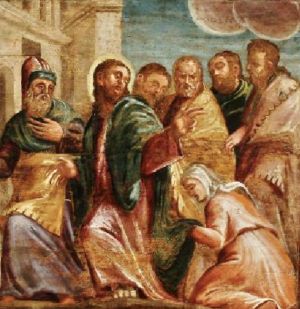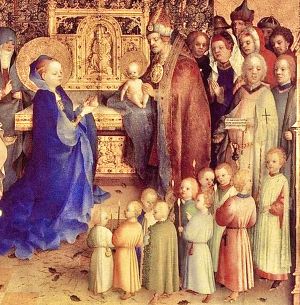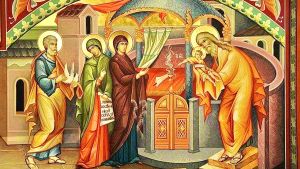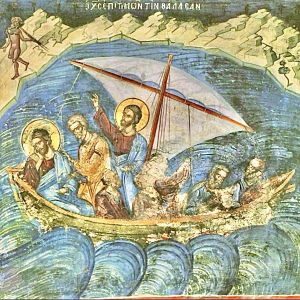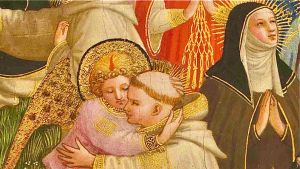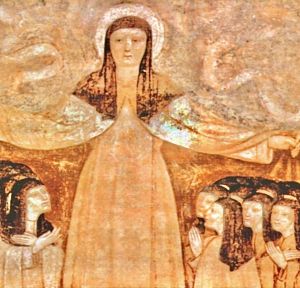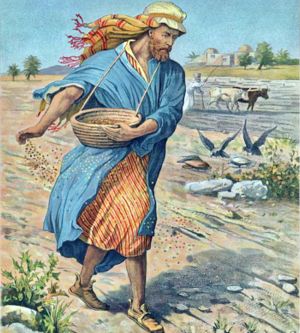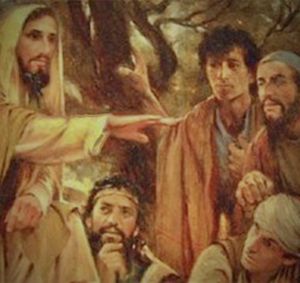
Teresa Girolami
Teresa Girolami è laureata in Materie letterarie e Teologia. Ha pubblicato vari testi, fra cui: "Pellegrinaggio del cuore" (Ed. Piemme); "I Fiammiferi di Maria - La Madre di Dio in prosa e poesia"; "Tenerezza Scalza - Natura di donna"; co-autrice di "Dialogo e Solstizio".
Belief and Healings. Grace and Faith, a happy pair
The Liturgy gives us the story of the healing of the haemorrhoissa, a poor sick woman - and the resuscitation of the daughter of Jairus, leader of the synagogue.
The common denominator of these episodes is the sincere trust that the Lord asks for and finds in some people.
Animated by indomitable Faith, Francis became Alter Christus and received from the Lord the Divine Energy for healing, testifying that God was in him and with him.
Already in his lifetime he performed many prodigies: for example, the one that took place in Nardi. A woman regained her sight the moment Francis made the sign of the cross.
Or the one that portrays Francis in distress for a friar suffering from epilepsy. He went to him and, after blessing him, cured him.
In the process of canonisation, more than 40 miracles were recognised by the authorities.
We report one of them, taken from the Sources and relating to after his death.
"The little son, barely seven years old, of a notary in Rome, had taken it into his head, as children do, to follow his mother who was going to the church of St Mark.
Since his mother had forced him to stay at home, he threw himself out of the window of the palace [...] The mother, seeing that she had suddenly lost her son [...] began to tear herself apart with her own hands [...].
But a friar of the Order of Friars Minor, named Rao, who was on his way there to preach, approached the child and then, full of faith, said to the father:
«Do you believe that Francis, the saint of God, can raise your son from the dead, by virtue of that love he always had for Jesus Christ, who died on the cross to give life to men?»
The father replied that he firmly believed this. The friar prostrated himself in prayer with his companion and incited all present to pray.
As the prayer was finished, the child began to yawn a little, opened his eyes and raised his arms, finally stood up on his own and immediately, in the presence of all, began to walk, safe and sound, restored to life and, at the same time, to salvation by the admirable power of the Saint" (FF 1266).
Prayer of Francis before the Crucifix (FF 276).
«Most glorious God
illuminate the darkness of my heart.
And give me firm faith
certain hope and perfect charity
wisdom and knowledge,
Lord,
that I may do thy holy and true commandment.
Amen».
Tuesday 4th wk. in O.T. (Mk 5,21-43)
The passage in Luke tells of the Presentation of Jesus in the Temple - as the true Light of nations and salvation of peoples, revealed to the multitudes.
The Sources recount that Francis had, among other things, an extraordinary regard for oil lamps, lamps and candles, and never wanted to extinguish their splendour by his own hand, because they were symbols of the eternal Light.
Likewise Clare, in a letter to Blessed Agnes of Prague:
"And since this vision of Him is the splendour of eternal glory, the gleam of everlasting light and a mirror without blemish, every day bring your soul, O Queen, bride of Jesus Christ, into this mirror and continually scrutinise your face in it [...]" (FF 2902).
The Saint, a man made prayer, always received from the Spirit of the Lord who guided him, all the light necessary to be a scrutiniser of consciences, a dismantler of pseudo-truths.
In fact, the episode that we take again from the Sources, attests to this:
"There was a friar, judging from the outside more than holy.
The brothers spoke at length about him to Francis, who was passing by.
But the Poverello replied to their praise thus:
"Stop, brothers, praising the devil's fictions in him. Know that this is diabolical temptation and fraudulent deception".
The brothers did not take kindly to this reply: according to them, it was impossible that falsehood and fraud could be dressed up under so many signs of perfection.
But, not many days later, when this fellow left the Order, it was clear to all that the man of God had read, with his luminous gaze, into the innermost secret of that heart.
This was the way in which he infallibly foresaw even the fall of many who seemed to stand upright; as well as the conversion of many sinners to Christ.
Hence it seemed as if he were now closely contemplating the mirror of eternal light, in whose wondrous splendour the eye of his spirit could see things physically distant as if they were present" (FF 1198).
Francis had encountered the Light in his existence, had been penetrated by it to the point of becoming, in Christ, himself a "sign" for many.
«Behold, this is set for the ruin and resurrection of many in Israel and for a sign contradicted [...] so that thoughts may be revealed to many hearts» (Lk 2:34-35)
February 2nd, Presentation of the Lord (Lk 2:22-40)
On this Sunday, the liturgy offers us the splendid passage from Matthew's Beatitudes.
The passage begins with poverty of spirit and concludes with the blessedness of those who are persecuted, that is, those who want to live the Gospel and love to the full.
For Francis and Clare of Assisi, humility of heart and interior and exterior poverty were the keystone of all the other beatitudes, the identikit of Jesus and of every disciple who wants to walk in his footsteps.
There is an enchanting passage on poverty in the «Sacrum Commercium» (an allegorical operetta by an unknown author) contained in the Sources, which we quote here.
«Thus, enamoured of your beauty, the Son of the Most High Father united himself closely to you alone in the world and knew you to be most faithful in all things.
Even before He came to earth from the splendour of His homeland, You prepared for Him a worthy dwelling, a throne on which to sit and a bedchamber where to rest, that is, the most poor Virgin, from whom He was born to shine upon this world.
You hastened to meet Him as soon as He was born, so that He might find in You, and not in softness, a place that was pleasing to Him.
He was laid, says the evangelist, in a manger, because there was no room for him in the inn.
In the same way, without ever separating yourself from him, you always accompanied him, so much so that throughout his life, when he appeared on earth and lived among men, while the foxes had their dens and the birds of the sky had their nests, he had nowhere to lay his head.
And later, when he, who had once opened the mouths of the prophets, opened his mouth to teach, he first wanted to praise you, he first exalted you with the words: Blessed are the poor in spirit, for theirs is the Kingdom of Heaven» (FF 1977).
Francis then, in his Admonitions, among other things, exalts the pure heart, precisely the poor heart, when he says:
«Blessed are the pure in heart, for they shall see God. Truly pure in heart are those who despise earthly things and seek heavenly things, and never cease to worship and see the Lord God, alive and true, with a pure heart and soul» (FF 165).
Chiara echoes this in her Testament:
«If we live according to the aforementioned way of life, we will leave a noble example to others and, through a very short period of effort, we will earn the prize of eternal bliss» (FF 2830).
«Blessed are the poor in spirit, for theirs is the kingdom of heaven» (Mt 5:3)
4th Sunday in O.T. A (Mt 5:12a)
In this passage from the Gospel of Mark, the episode of the storm calmed by the Lord of history and glory is narrated.
Jesus commands the winds and says to the sea: «Shut up, be quiet!» (Mk 4:39) and, faced with the fear of his own, he calls their faith into question.
Francis, the Herald of the Gospel, a few years after his conversion, guided by the Spirit that pushes the sail of human existence, wished to die for Christ in the proclamation of the Word, overseas.
His encounter with Jesus had made him courageous and tenacious, so much so that he urged his own brothers to abandon all fear as they sailed through the storms of the world.
It is interesting to stop and meditate on a passage from the Sources that portrays Francis in the experience of headwinds.
"Six years after his conversion, inflamed by the desire for martyrdom, he decided to cross the sea and go to the parts of Syria to preach the Christian faith and penance to the Saracens and other infidels.
But the ship on which he had embarked, in order to reach that country, was forced by contrary winds to disembark in the parts of Schiavonia.
He remained there for some time; but then, not being able to find a ship to go to the overseas countries, defrauded in his desire, he begged some sailors, bound for Ancona, to take him with them, for the love of God. He was flatly refused, because he did not have the necessary money.
Then the man of God, putting all his trust in the goodness of the Lord, secretly boarded the ship anyway, with his companion.
A fellow came along - certainly sent by God to help his poor fellow - bringing with him the necessary food.
He called one of the sailors, who had the fear of God, and spoke to him as follows: "Keep all this stuff for the poor brothers who are hiding on the ship: you will give it to them when they need it".
Except that, it happened that, because of the violence, the sailors could not disembark for many days and so consumed all the provisions.
All that was left was the food offered in alms, from above, to poor Francis.
It was very scarce, in truth; but the divine power multiplied it in such a way that it was enough to fully satisfy the needs of all, for all those stormy days, until they could reach the port of Ancona.
The sailors, seeing that they had escaped death many times through the merits of the servant of God, gave thanks to Almighty God, who always shows himself admirable and loving in his friends and servants.
With good reason, for they had experienced at first hand the dreadful dangers of the sea and had seen the admirable works of God in the deep waters" (FF 1170).
We read again of the Poverello:
"Having left the sea, he began to wander the earth, sowing there the seed of salvation and reaping an abundant harvest of good fruits" (FF 1171).
"Comforting himself in the Lord, he prayed confidently and repeated singing that word of the prophet: for even if I should walk in the midst of the shadow of death, I will fear no evil, for you are with me" (FF 1172).
His faith in Christ made him overcome all fears, sleeping in the stern of unfortunate situations, knowing in Whom he had placed all hope.
«Why are you fearful? Have you no faith yet?»
Saturday 3rd wk. in O.T. (Mk 4:35-41)
Blessed are the poor in spirit, because of the Holy Spirit
Jesus tells parables about the Kingdom of God, taking his cue from the elements of nature: seed, ear, mustard seed, and more.
With natural and real hooks he explains the physiognomy of the Kingdom.
Francis and Clare of Assisi were two grains of mustard seed that grew in humility and hiddenness and became such large trees that many creatures found shelter on their branches.
Specifically, the Papal Bull of canonisation 'Clara Claris praeclara' speaks of Clare as follows:
«This was the tall tree, reaching towards the heavens, with large branches, which in the field of the Church produced sweet fruit [...] and in whose pleasant and pleasant shade many followers flocked from all sides, and still flock to enjoy its fruits» (FF 3294).
The Kingdom of God finds development in these singular metaphors of which the Poor Man of Assisi and the recluse Clare are plastic and concrete testimonies.
But Francis too, like Jesus, spoke to his brothers in parables. The Sources attest to this in various passages.
When he wanted to make them understand the path that awaited them in order to welcome the Kingdom of God, he called to mind various parables, traversed in the fabric of the Gospel.
We recall one among many, with which he announced the Word that the Lord entrusted to him.
By presenting himself to the Pope, Jesus made him understand how he had to express himself.
"He, in fact, told the Pontiff as God had suggested it to him, the parable of a rich king who, with great joy, had married a beautiful and poor woman and had children who had the same appearance as the king, their father, and who, therefore, were brought up at the king's own table.
He then gave the interpretation of the parable, coming to this conclusion:
«There is no need to fear that the sons and heirs of the eternal King should starve; for they, in the likeness of Christ, were born of a poor mother, by virtue of the Holy Spirit, and were begotten, by virtue of the spirit of poverty, into a poor religion.
For if the King of heaven promises his imitators the eternal kingdom, how much more will he provide for them those things which he bestows without distinction upon the good and the bad».
The Vicar of Christ listened attentively to this parable and its interpretation and, filled with wonder, recognised without a shadow of doubt that, in this man, Christ had spoken.
But he also felt reassured by a vision he had at that time, in which the Spirit of God had shown him the mission to which Francis was destined.
In fact, as he recounted, in his dream he saw that the Lateran Basilica was about to ruin and that a poor, small, contemptible-looking man was supporting it, putting his shoulders under it, so that it would not fall.
«Truly," the Pontiff concluded, «this is the one who by his work and doctrine will uphold the Church of Christ» (FF1064).
"Counting on divine grace and papal authority, Francis, full of confidence, set out for the Spoleto valley, ready to practise and teach the Gospel" (FF 1065).
These parables are also a narrative of the coming of the Kingdom of God, its expansion in the mustard seed of Francis and Clare, and their incredible development.
«And he said: How shall we compare the Kingdom of God? Or in what parable shall we put it? As to a grain of mustard seed which when sown on the earth is smaller than all the seeds on earth» (Mk 4:30-31)
Friday, 3rd wk. in O.T. (Mk 4:26-34)
Granted that Francis considered the preachers of the Word to be the «lamp of the world» and that the Spirit of God made him so, marvellous is what we read in the Sources, an exalted collection of Franciscan realities.
"Irradiated by the splendours of eternal light, he scrutinised the depths of the Scriptures with a clear and acute intellect.
His intellect, pure from all stain, penetrated the secret of the mysteries, and where the science of masters is excluded, he entered with the affection of a lover.
He read, from time to time, the sacred books and kept tenaciously imprinted in his memory what he had once assimilated: for he continually ruminated with affectionate devotion what he had listened to with an attentive mind" (FF 1187).
Likewise Clare, seraphic little plant, is recognised in the
Legend as the one in whom "the merciful God [...] made a very bright lamp shine for women: and you, most blessed Father*, by ascribing her to the number of the Saints, prompted by the power and evidence of miracles, have placed this lamp on the candelabrum, so that it may give light to all those who are in the house" (FF 3151).
"So Clare, while she was alive, shone by the light of her merits: and now, that she is bathed in endless clarity, no less does she still shine, by the marvellous light of miracles, to the ends of the earth" (FF 3262).
It was a miracle to see her (when she lived within the Damianite walls exuding holiness):
"[...] for Matins, she would prevent the young girls and, waking them noiselessly with nods, she would invite them to the praises of God. Often, while they were all still asleep, she would light the lamps, often she herself would ring the bell with her hands" (FF 3200).
"Certainly, in his gentleness, God had given the poor girl a banquet and, after having flooded her soul in prayer with his eternal Light, he manifested it outside sensibly" (FF 3199).
«Does the lamp come to be put under the bushel or under the bed?» (Mk 4:21)
*St Clare's canonisation took place in Anagni by Pope Alexander IV on an unspecified date, varying between August, 26 September and 19 October 1255.
Thursday 3rd wk. in O.T. (Mk 4,21-25)
In the Parable of the Sower, Jesus emphasises the different reception and assimilation of the Word of God, and consequently the different fruit, depending on the suitability of the soil.
The new Evangelist of the latter time, Francis, was in love with the Word of God and listened to it constantly, so much so that it was imprinted in his memory.
It was good soil that produced one hundred per cent.
The Sources inform us:
"Irradiated by the splendours of the eternal Light, he scrutinised the depths of the Scriptures with a clear and acute intellect.
His intellect, pure from all stain, penetrated the secret of the mysteries [...].
He read from time to time the sacred books and kept tenaciously imprinted in his memory what he had once assimilated: for he continually ruminated with affectionate devotion what he had listened to with an attentive mind" (FF 1188).
"With equal care and devotion he committed himself to the other teachings he had heard.
For he had never been a deaf hearer of the Gospel, but, entrusting everything he heard to a commendable memory, he sought with all diligence to carry it out to the letter' (FF 357).
As Celano calls him, in the Vita prima - "river of Paradise" - Francis, "the new evangelist of this last age spread the waters of the Gospel with loving care throughout the whole world, and by his works he pointed out the way and the true doctrine of the Son of God" (FF 475).
In the Regola non bollata (1221):
"Let us therefore hold fast to the words, life, doctrine and Holy Gospel of Him who deigned to pray for us to the Father" (FF 62).
And "let us beware of being the ground along the road, or the stony ground, or the ground overrun with thorns according to what the Lord says in the Gospel:
«The seed is the Word of God [...] the seed entrusted to the good soil, are those who, hearing the word with good, indeed excellent dispositions, understand and guard it and bear fruit with perseverance»" (FF 58).
The little Poor was, for his time, a concrete and fruitful incarnation of the Gospel.
«And other seeds fell on the good earth and bore fruit by rising and growing and bearing one thirty and one sixty and one hundred» (Mk 4:8)
Wednesday 3rd wk. in O.T. (Mk 4,1-20)
With an astonishing twist of hand, Jesus explains who his mother and brothers are: those who embody the will of God.
After their conversion, Francis and Clare always sought God's will by looking to Mary, the handmaid of the Lord, the one who had found favour with the Almighty by becoming the Mother of Jesus.
Francis, from the very beginning of his vocation-mission paid special and devoted attention to the Virgin.
The Sources make us aware of his extraordinary love for Her, summed up by a hieratic antiphon of the Poverello:
"Holy Virgin Mary, there is none like thee, born in the world, among women, daughter and handmaid of the most high King the heavenly Father, mother of our most holy Lord Jesus Christ, spouse of the Holy Spirit; pray for us with Saint Michael the Archangel and with all the powers of heaven and with all the saints, to thy most holy beloved Son, Lord and Master" (FF 281).
Francis 'surrounded the Mother of Jesus with an unspeakable love, because she had made the Lord of majesty our brother' (FF 786).
But Clare herself was considered 'altera Maria' when she arrived at the Portiuncula, where Francis and the brothers awaited her for her total dedication to God:
"After she had taken the insignia of holy penance before the altar of St. Mary and, as if before the nuptial thalamus of the Virgin, the humble handmaiden had been married to Christ, immediately St. Francis led her to the church of St. Paul*, with the intention that she should remain there until the Will of the Most High disposed otherwise" (FF 3172).
Like Mary, Clare pronounced her "Fiat" to the will of the Father.
Oh how they both loved the will of God!
Forgetting themselves, they adhered to the divine plan for them, each in their own time, each in their own groove.
In the Sources again:
"In the same way, then, that the glorious Virgin of virgins bore Christ materially in her womb, you too, following his vestiges, especially of his humility and poverty, can always, without any doubt, bear him spiritually in your chaste and virginal body.
And you will contain in you Him by whom you and all creatures are contained, and you will possess that which is the most lasting and definitive good even in comparison with all the other transient possessions of this world" (FF 2893 - Letter three to Blessed Agnes of Prague).
Francis and Clare, following the example of the humble Mary of Nazareth, loved God's will for them in a sunny and lasting way.
In fact, in a concluding prayer of Francis, we contemplate his constant yearning to seek it and indulge it with abandon.
"Almighty, eternal, just and merciful God, grant to us miserable people to do, by the power of your love, what we know you want, and to always want what pleases you, so that, inwardly purified, inwardly enlightened and kindled by the fire of the Holy Spirit we may follow in the footsteps of your beloved Son, our Lord Jesus Christ, and, with the help of your grace alone, come to you, O Most High, who in perfect Trinity and simple Unity live and reign glorious, Almighty God for ever and ever. Amen" (FF 234 - Letter to the whole Order).
«And answering, he says to them: Who is my mother and brothers? [Whoever does the will of God is my brother and sister and mother» (Mk 3:33, 35)
*The church and the Benedictine monastery of San Paolo delle Abbadesse, where Clare was led after her consecration in the Portiuncula, stood near Bastìa Umbra, 4 km from Assisi.
Tuesday 3rd wk. in O.T. (Mk 3,31-35)
Anyone who welcomes the Lord into his life and loves him with all his heart is capable of a new beginning. He succeeds in doing God’s will: to bring about a new form of existence enlivened by love and destined for eternity (Pope Benedict)
Chi accoglie il Signore nella propria vita e lo ama con tutto il cuore è capace di un nuovo inizio. Riesce a compiere la volontà di Dio: realizzare una nuova forma di esistenza animata dall’amore e destinata all’eternità (Papa Benedetto)
You ought not, however, to be satisfied merely with knocking and seeking: to understand the things of God, what is absolutely necessary is oratio. For this reason, the Saviour told us not only: ‘Seek and you will find’, and ‘Knock and it shall be opened to you’, but also added, ‘Ask and you shall receive’ [Verbum Domini n.86; cit. Origen, Letter to Gregory]
Non ti devi però accontentare di bussare e di cercare: per comprendere le cose di Dio ti è assolutamente necessaria l’oratio. Proprio per esortarci ad essa il Salvatore ci ha detto non soltanto: “Cercate e troverete”, e “Bussate e vi sarà aperto”, ma ha aggiunto: “Chiedete e riceverete” [Verbum Domini n.86; cit. Origene, Lettera a Gregorio]
In the crucified Jesus, a kind of transformation and concentration of the signs occurs: he himself is the “sign of God” (John Paul II)
In Gesù crocifisso avviene come una trasformazione e concentrazione dei segni: è Lui stesso il "segno di Dio" (Giovanni Paolo II)
Only through Christ can we converse with God the Father as children, otherwise it is not possible, but in communion with the Son we can also say, as he did, “Abba”. In communion with Christ we can know God as our true Father. For this reason Christian prayer consists in looking constantly at Christ and in an ever new way, speaking to him, being with him in silence, listening to him, acting and suffering with him (Pope Benedict)
Solo in Cristo possiamo dialogare con Dio Padre come figli, altrimenti non è possibile, ma in comunione col Figlio possiamo anche dire noi come ha detto Lui: «Abbà». In comunione con Cristo possiamo conoscere Dio come Padre vero. Per questo la preghiera cristiana consiste nel guardare costantemente e in maniera sempre nuova a Cristo, parlare con Lui, stare in silenzio con Lui, ascoltarlo, agire e soffrire con Lui (Papa Benedetto)
In today’s Gospel passage, Jesus identifies himself not only with the king-shepherd, but also with the lost sheep, we can speak of a “double identity”: the king-shepherd, Jesus identifies also with the sheep: that is, with the least and most needy of his brothers and sisters […] And let us return home only with this phrase: “I was present there. Thank you!”. Or: “You forgot about me” (Pope Francis)
Nella pagina evangelica di oggi, Gesù si identifica non solo col re-pastore, ma anche con le pecore perdute. Potremmo parlare come di una “doppia identità”: il re-pastore, Gesù, si identifica anche con le pecore, cioè con i fratelli più piccoli e bisognosi […] E torniamo a casa soltanto con questa frase: “Io ero presente lì. Grazie!” oppure: “Ti sei scordato di me” (Papa Francesco)
Thus, in the figure of Matthew, the Gospels present to us a true and proper paradox: those who seem to be the farthest from holiness can even become a model of the acceptance of God's mercy and offer a glimpse of its marvellous effects in their own lives (Pope Benedict))
Nella figura di Matteo, dunque, i Vangeli ci propongono un vero e proprio paradosso: chi è apparentemente più lontano dalla santità può diventare persino un modello (Papa Benedetto)
duevie.art
don Giuseppe Nespeca
Tel. 333-1329741
Disclaimer
Questo blog non rappresenta una testata giornalistica in quanto viene aggiornato senza alcuna periodicità. Non può pertanto considerarsi un prodotto editoriale ai sensi della legge N°62 del 07/03/2001.
Le immagini sono tratte da internet, ma se il loro uso violasse diritti d'autore, lo si comunichi all'autore del blog che provvederà alla loro pronta rimozione.
L'autore dichiara di non essere responsabile dei commenti lasciati nei post. Eventuali commenti dei lettori, lesivi dell'immagine o dell'onorabilità di persone terze, il cui contenuto fosse ritenuto non idoneo alla pubblicazione verranno insindacabilmente rimossi.


